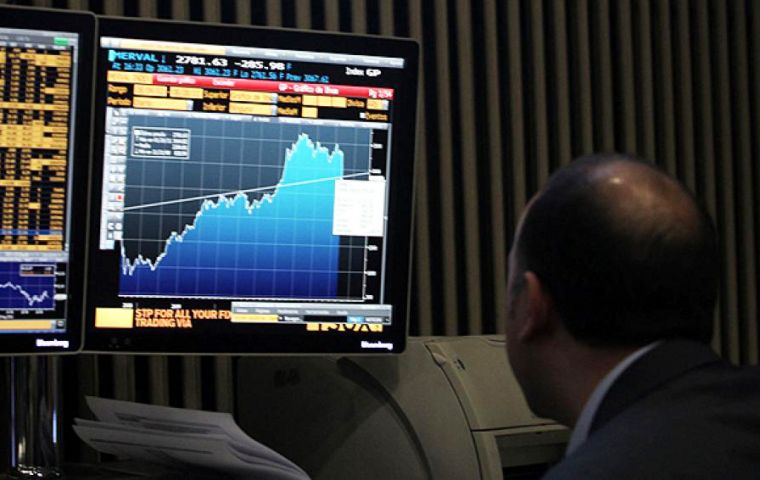MercoPress. South Atlantic News Agency
Despite all the negative economic data, Argentina's stock market has almost doubled this year
 Much of the money flowing into Argentina's Merval this year has come from wealthy Latin American investors
Much of the money flowing into Argentina's Merval this year has come from wealthy Latin American investors  In Latin America, many think Argentina can find a way out of its current malaise, and faster than neighboring Brazil which has fallen into recession.
In Latin America, many think Argentina can find a way out of its current malaise, and faster than neighboring Brazil which has fallen into recession. Despite all the negative news on government restrictions imposed on the Argentine economy and the shortage of hard currency, the country's Merval Index has skyrocketed almost 100% this year, the highest of any stock market in the world. It includes many of the largest companies in the country such as Telecom Argentina and Energy Petrobras, along with banks and a steel maker.
Much of the money flowing into Argentina stocks this year has come from wealthy Latin American investors, particularly those from Uruguay and Brazil, according to Paul Christopher, Chief International Strategist at Wells Fargo Advisors in St. Louis.
He believes many of these regional investors have a unique perspective because they have contacts in Argentina. They're willing to look past the nation's economic problems if they think there's a great return to be made.
“They know people there and can make investments feeling a little less concerned,” Christopher said. “People believe the government can get out of this mess, whether that's right or wrong.”
Argentina is still locked in a bitter battle with the so-called holdout bondholders, largely made up of hedge funds, from its 2001 default. The populist government of President Cristina Fernandez has refused to pay up, regularly referring to the holdouts as “vultures.”
Inflation is also out of control. According to government data, it is around 30%, but many analysts suspect it's actually twice that. Argentina's peso has been in free fall since the beginning of the year, and there are fears that the government is running dangerously low on foreign currency reserves -- funds that are needed for a variety of purposes, including paying bondholders.
Argentina hasn't opened up its books to the International Monetary Fund (IMF) in years. Still, Argentina's stock market performance shows that many investors, at least in Latin America, think the country can find a way out of its current malaise.
Christopher noted that Brazil, which up until a few years ago was an economic powerhouse, is in recession, and the prospects there look even worse than Argentina. “People think there's a light at the end of the tunnel, that Argentina has more room to run,” he said. “You get paid to take that risk”.
And in related news the Argentine Central Bank ordered banks and financial institutions to report overseas payments which surpass 150,000 dollars, in a new effort to stem the flight of the US currency out of Argentina and the reduction in the entity's international reserves.
The measures means that the upper limit for financial entities, previously set at 300,000 dollars, has been cut to reach 150,000 dollars. For amounts higher than that ceiling, those responsible are obliged to inform the Central Bank of their transactions.
Officials from the Central Bank warned currency traders that they would have to give prior notice of any dollar purchase that clears the new limit on the wholesale market. Any subsequent transaction would be subject to the Central granting authorization, with no purchase possible until permission was granted.
The new restrictions could cause further complications in the transactions carried out in the financial system to fund foreign imports or payments of services for small and medium-sized businesses.




Top Comments
Disclaimer & comment rules-

-

-

Read all commentsCould it be that all the domestic restrictions have meant there are few places that Argentines can actually “store” their savings? Shares in a business are probably better protection than a savings account with 5% interest in a 40% inflation economy.
Sep 11th, 2014 - 08:55 am 0We know Argentina is a basket case economy so there must be another explanation for this huge rise.
Perhaps this is due to the 'real' value of the peso being considerably lower than the 'official' value?
Sep 11th, 2014 - 09:07 am 0Sounds like speculators and hoarders to me. :-)
Sep 11th, 2014 - 09:32 am 0Commenting for this story is now closed.
If you have a Facebook account, become a fan and comment on our Facebook Page!